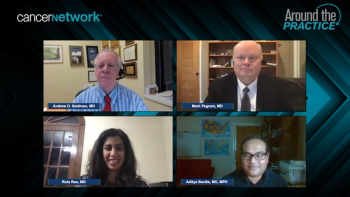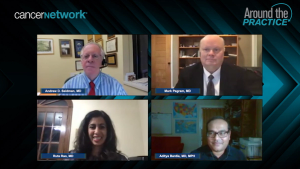
Experts discussed the changing landscape in treatments for HER2-positive metastatic breast cancer.

Your AI-Trained Oncology Knowledge Connection!


Experts discussed the changing landscape in treatments for HER2-positive metastatic breast cancer.

Experts close out their discussion on the management of HER2+ metastatic breast cancer by highlighting their hopes for future treatment strategies.

Centering their conversation on a patient case, experts discuss the sequencing and monitoring of therapy in patients with HER2+ metastatic breast cancer.

Panelists field questions from a live audience regarding the optimal selection of therapy for patients with metastatic breast cancer.

In another patient case, panelists break down third-line therapy options for someone with HER2+ metastatic breast cancer and lung disease.

Moving to optimal treatment approaches in second-line therapy, experts close out a patient case of HER2+ metastatic breast cancer.

Using a patient case to center their discussion, the panel reviews frontline treatment options for HER2+ metastatic breast cancer and the rationale behind selection.

Fielding questions from a live audience, experts discuss the lack of biomarkers in HER2+ metastatic breast cancer and how one might address progression of bone disease.

A panel of experts reviews clinical trial data in recurrent HER2-positive metastatic breast cancer and discusses impacts on treatment selection.

Panelists provide an overview of the treatment landscape for patients with HER2-positive metastatic breast cancer.

This landscape of endocrine therapy for metastatic breast cancer is changing rapidly. The recent report that palbociclib improved median PFS when combined with fulvestrant in patients with progression despite prior endocrine therapy is compelling.

Anthracyclines have occupied a prominent position in the adjuvant systemic treatment of early breast cancer for decades. Th is position was supported by the evidence from the latest overview of the Early Breast Cancer Trialists’ Collaborative Group (EBCTCG) showing an absolute survival benefit of about 4% at 10 years for anthracycline-containing regimens versus CMF-like regimens.

In order to frame this commentary on Higgins and Wolff’s review of current treatment options for metastatic breast cancer, I started with a PubMed search of Dr. Marty Abeloff’s work from more than 3 decades ago. This was partly motivated by my own curiosity about a leader whose early career was largely unknown to me, and partly by the desire to see whether “the more things change, the more they remain the same.”

Over the past 20 years we have witnessed the emergence of a new generation of aromatase inhibitors as valuable antiestrogens in the management of both advanced and early-stage breast cancer. In addition, the list of cytotoxic chemotherapeutic agents useful in the control of breast cancer has grown considerably. The emergence of anthracyclines was a major chemotherapeutic step forward in the 1980s, and the taxanes have clearly been the agents with the greatest impact on breast cancer treatment over the past decade. The end of the past 2 decades has been characterized by a greater understanding of the molecular biology of breast cancer, rational drug design, and the development of agents that disrupt specific cellular targets and pathways. The development of better prognostic and predictive assays that employ a panel of genes involved in the malignant and metastatic phenotype promises to allow clinicians to better select patients who could forgo adjuvant chemotherapy. Finally, adjunctive and supportive therapy of breast cancer has evolved substantially over the past 20 years. This review will highlight some of the landmark accomplishments during this time, and offer a glimpse at where we might be 20 years from now.

Targeted therapies offer a new approach to breast cancer treatment.Rather than eliminating both malignant and normal cellsnonspecifically, these so-called “rational” therapies exploit second messengerproteins, ligands, and receptors that are known to be upregulatedin neoplastic cells, or are implicated in cancer metastasis. This reviewwill highlight a number of these targets and the mechanisms that havebeen targeted in drug design. We will also describe recently completedand currently ongoing clinical trials investigating targeted therapiesand their potential to augment standard breast cancer therapy.

Use of the gemcitabine (Gemzar) plus docetaxel (Taxotere) combinationin metastatic breast cancer is motivated by the different mechanismsof action of the drugs, partially nonoverlapping toxicity profiles,and good single-agent activities of both drugs in treatment-naive andanthracycline-pretreated patients. In phase II trials, combinations ofgemcitabine at 900 or 1,000 mg/m2 on days 1 and 8 and docetaxel at 75to 100 mg/m2 on either day 1 or day 8 every 3 weeks, or gemcitabine at800 mg/m2 on days 1, 8, and 15 and docetaxel at 35 mg/m2 on days 1, 8,and 15 or 100 mg/m2 on day 1 every 4 weeks, have produced responserates of 36% to 79% in patients receiving primarily second-line treatment;response rates were greater than 50% in five of six studies. Inphase II trials using every-2-week regimens of gemcitabine at 1,500 or2,000 mg/m2 on day 1 and docetaxel at 50 or 65 mg/m2 on day 1 or 55mg/m2 on day 8, response rates were 50% in pretreated patients and66% in treatment-naive patients. Neutropenia is the primary toxicity ofthe combination; in phase II studies performed with or without growthfactor support, rates of grade 3/4 neutropenia ranged from 29% to 79%and rates of febrile neutropenia ranged from 0% to 18%. An ongoingphase III trial is comparing gemcitabine at 1,000 mg/m2 on days 1 and8 plus docetaxel at 75 mg/m2 on day 1 every 21 days, vs capecitabine at1,000 mg/m2 twice daily for 14 days plus docetaxel at 75 mg/m2 on day1 every 21 days in patients with metastatic breast cancer. Results of thistrial will help to determine optimal use of taxane-based combinationsin patients with advanced disease.

The clinical development of trastuzumab(Herceptin) for thetreatment of HER2-overexpressingbreast cancer has been perhapsthe most important recentadvance in the management of metastaticbreast cancer. In their rigorousand comprehensive review, Emensand Davidson highlight the importanttrials that resulted in the US Food andDrug Administration (FDA) approvalof trastuzumab, discuss combinationchemotherapy options with trastuzumab,and preview promising futurestrategies for combining trastuzumabwith other targeted biologic agents.

It is fair to say that combination chemotherapy is the standard of care inmetastatic breast cancer. In many ways, however, the burden of proof that it isthe standard of care remains with those who advocate combination therapy.Some of the push to consider combination therapy as the standard is provided by ameta-analysis of trials comparing single-agent and combination therapy in thissetting, which was reported by Fossati et al in 1998.[1] Although the vast majorityof individual trials included in the analysis did not show significant differences inhazard ratios for death, the meta-analysis showed a significant mortality advantagefor combination therapy. Yet the total population considered in this meta-analysis(990 patients in combination groups, 996 in single-agent groups) is not largecompared with some recent phase III trials in metastatic breast cancer, includingone reported by Sledge et al that showed that sequential doxorubicin and paclitaxelwas equivalent to the concurrent combination.[2] Further, no studies includingtaxanes are included in the meta-analysis, raising questions about the application ofits findings to contemporary oncology. In addition, the trials included did notexamine sequential single-agent treatment, an approach that clearly has merit andthat requires additional consideration and study.

The need for accurate detection of HER2 status is becoming more apparent, as therapeutic decisions are influenced by this information in both the adjuvant and advanced-stage setting. Since the US Food and Drug

Many active cytotoxic agents exist for breast cancer therapy, and numerous combination chemotherapy regimens are derived from them. Creating these combinations is sometimes empirically motivated by non-overlapping

Recent trials comparing single-agent vs combination therapy in metastatic breast cancer suggest that it may be time to reconsider the belief that combination chemotherapy is the gold standard of treatment. Based on the

A preliminary report of a phase II trial of paclitaxel (Taxol) administered in a dose-dense manner as first- and second-line therapy for metastatic breast cancer is presented. Patients who had received one or two prior

Overexpression by the HER2 gene plays a significant role in breast cancer pathogenesis, and the phenomenon is commonly regarded as a predictor of a poor prognosis. HER2 overexpression has been linked to sensitivity and/or resistance to hormone therapy and chemotherapeutic regimens, including CMF (cyclophosphamide, methotrexate, and fluoro-uracil) and anthracyclines. Studies of patients with advanced disease demonstrate that, despite the association of HER2 overexpression with poor prognosis, the odds of HER2-positive patients responding clinically to taxanes were greater than three times those of HER2-negative patients. Further studies in preclinical models used combination therapy for breast cancer cells that overexpress HER2, and the use of agents that interfere with HER2 function plus paclitaxel (Taxol) resulted in significant antitumor effects. [ONCOLOGY 11(Suppl):43-48, 1997]

The proven safety profile and antitumor activity of paclitaxel (Taxol) in the treatment of metastatic breast cancer led investigators at Memorial Sloan-Kettering Cancer Center (MSKCC) to further examine the agent's potential in the treatment of advanced breast cancer. Efficacy and tolerability studies of paclitaxel as single-agent therapy were undertaken, along with parallel investigations of quality-of-life parameters. The studies examined the effects of 96-hour infusion schedules of paclitaxel and are currently assessing the feasibility of a weekly 1-hour infusion schedule. Researchers at MSKCC also compared the results of a variety of two- and three-drug paclitaxel-containing regimens to determine possible synergism and better define safety profiles. They examined the combination of paclitaxel and edatrexate, as well as a promising combination of paclitaxel and a monoclonal antibody directed at growth factor receptors. The latter ongoing trial will include both laboratory studies that examine possible cellular mechanisms for the combination's observed synergy and a clinical trial that combines paclitaxel with a monoclonal antibody directed against the epidermal growth factor. In conclusion, the investigators discuss the optimal integration of paclitaxel into doxorubicin/cyclophosphamide (Cytoxan, Neosar)-based adjuvant therapy for node-positive stage II-III resectable breast cancer. [ONCOLOGY 11(Suppl):20-28, 1997]

Published: December 31st 2021 | Updated:

Published: November 16th 2021 | Updated:

Published: February 1st 2001 | Updated:

Published: March 1st 1997 | Updated:

Published: November 2nd 2008 | Updated:

Published: May 1st 2008 | Updated: